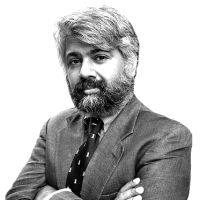
With the flagrant exception of Raniero Cantalamessa, the Vatican preacher who likens the current assault on the Roman Catholic Church to the worst excesses of anti-Semitism, no one—not even the pope himself—miscalculates the enormity of the affliction that is currently upon the church. Critics have likened the crisis, brought about by revelations of widespread and unpunished pedophilia by priests, to the church’s worst since the Reformation. Benedict XVI, in his pastoral letter last month to the Catholics of Ireland, was unsparing in his assessment of the extent of the damage done to the church: The scandals, he said, “have obscured the light of the Gospel to a degree that not even centuries of persecution succeeded in doing.”
One can see in the public reaction among the faithful the emergence of the Catholic Church’s version of the Tea Party.
Predictably, given the extent and nature of the crimes in question, critics of all stripes have lined up to land blows on the Vatican and at the pope—some deserved, some gratuitous. Critics, including the lawyer Geoffrey Robertson, have even called for Benedict to be prosecuted for crimes against humanity, raising visions of a sex-crimes Nuremberg that would reduce the Vatican to rubble.
With all due respect to Robertson, that is a truly terrible idea, quite apart from the fact that the pope could almost certainly invoke sovereign immunity from prosecution in any domestic tribunal. The idea to prosecute springs, irresistibly, from the tendency in our society to see every problem, no matter how complex, as susceptible to legal resolution, and from our view of the law as a sort of magic wand, the waving of which results in this cathartic thing called “justice.” Other forms of resolution—political or spiritual resolution, for example, or compromises made for the protection of a greater ideal—are deemed inadequate by our law-obsessed culture.
Yet frankly, the law provides no good options here, and lawyers should leave the pope alone. Any attempt to prosecute Benedict XVI by showboating judges in states like Spain (where courts claim a “universal jurisdiction” in cases of crimes against humanity) or Britain (where Augusto Pinochet was prosecuted, and where the pope is due to visit in September) would derail the much, much more important process that is under way in the Catholic Church: that of intense self-examination.
The pope, in the pastoral letter I cite above, has made clear that he is among the soul-searchers who ask how such “egregious crimes”—his words—could have occurred in the bosom of a church whose raison d’être is to bring succor to the vulnerable. Part of that soul-searching is, surely, intensely personal: Who can doubt that Benedict does not ask himself whether he could not—and should not—have done more to address the rot in the church when he was a cardinal to whom some of the ugly facts of child abuse were made known?
It would be appropriate, also, for ordinary members of the Catholic Church to ask Benedict these same questions—and it is clear that they are doing so. An organic movement—grounded in a love for the church and an outrage against its defilement by errant priests—is rapidly gathering shape, a movement whose aim is to change the way the church conducts itself. One can see in the public reaction among the faithful—in Ireland, in the United States, in Mexico, and in Italy—the emergence of the Catholic Church’s version of the Tea Party, pan-national in scale.
Anti-clerical movements have always had strong roots among Catholics; but now, most disconcertingly for the clergy, it is the faithful who are asking the most adamant, probing questions. These questions will not be easily dodged; nor will the faithful be placated by casuistry or platitudes. For the sake of the church, however, and for the sake of the faith of the faithful, it is important that secular legal intervention not encroach upon center stage: That space should be reserved for those ordinary Catholics who demand change and accountability; who demand better service (as it were) from those whose vocation it is to serve; who demand apologies and recompense; who demand a brand new architecture of priesthood and, yes, a new compact between the pope and his flock.
Benedict is a wise man, and more worldly, by far, than his predecessor. He knows that the current crisis has ensured that his papacy will be the first of a new sort of scathed papacy: henceforward, no pope will be beyond the reach of his flock, and the wrath of his flock. His predecessor was the last “infallible” pope. Benedict XVI is the first of the fallible popes, and a recognition of that fact lies at the heart of all reform to come.
And so it is important that Benedict be allowed to conduct himself with dignity, to be free from the shadow of gaudy prosecution, and to be unhampered in his dialogue—impassioned, honest, painful, and emotional—with Catholic faithful around the world. The church is worth saving, but only the church can save the church. Lawyers can’t. Let us, then, allow Pope Benedict to get on with the most important task that has ever confronted a pope in the modern era. In the unlikely event that he hasn’t the wisdom to do the right thing, we can be sure that his flock will tell him so.
Tunku Varadarajan is a national affairs correspondent and writer at large for The Daily Beast. He is also a research fellow at Stanford’s Hoover Institution and a professor at NYU’s Stern Business School. He is a former assistant managing editor at The Wall Street Journal. (Follow him on Twitter here.)






